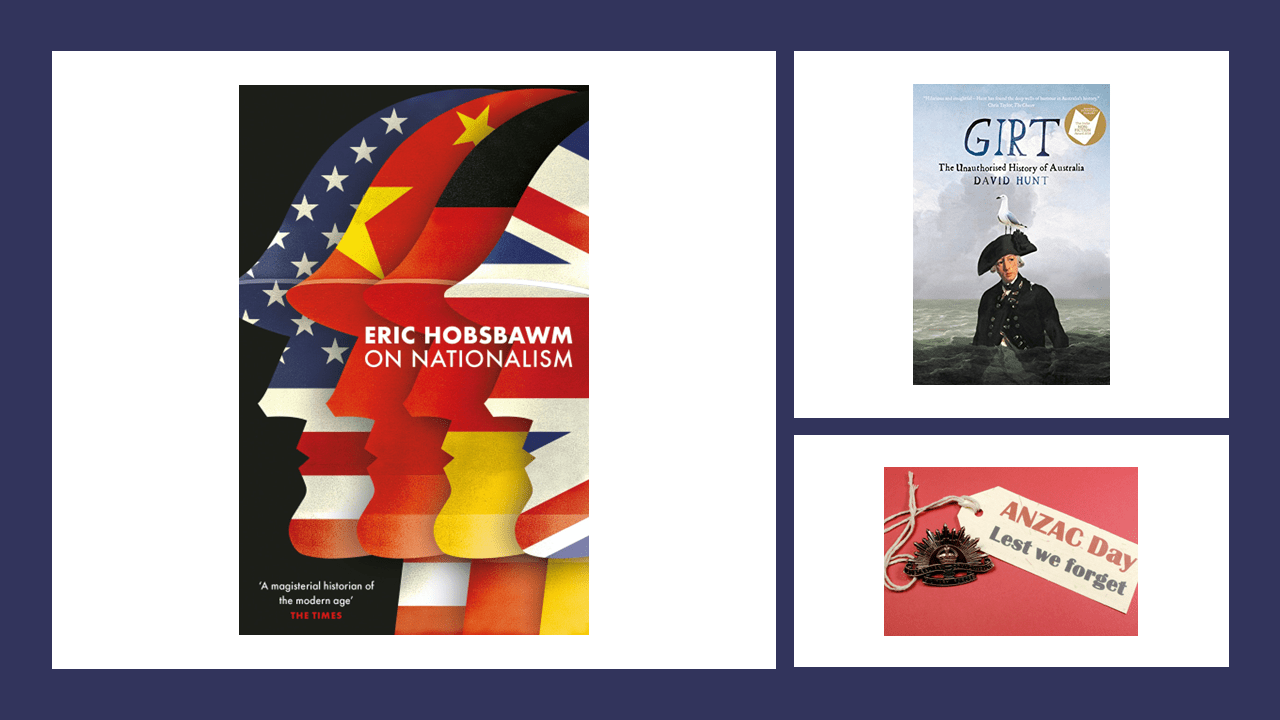“…What we find today is the complete absence of the kind of concern with Americanization which one found in the United States in the 1880 to 1922 period. And this is a real problem. Possibly only in Australia, among the countries with mass immigration, does one find a basic concern for integrating and creating a sort of national unity.”
Eric Hobsbawm, On Nationalism, p. 158 (Abacus, 2021)
“Heroic tales of the Anzacs, Ned Kelly and Shane Warne had to be replaced with boring stories about bunya nuts…A proper history is built upon great deeds. A proper history also requires lots of dates for things to have happened on. If there is no record of when things are done, then there can be no measure of progress. History is all about progress and Aborigines keep on getting in its way…This is, of course, only one view of Aboriginal history. Before we consider alternative theories as to how Australia’s unoriginal non-inhabitants didn’t come here and what they didn’t not do after their failed non-arrival, we should talk a little about armbands…They [white armband school of thought] use words like ‘natural attrition’, ‘vulnerable children in need of care and protection’ and ‘Windschuttle’. They can be identified by their rose-coloured glasses or their white-coloured canes and golden-coloured retrievers. Many members of this school work in talk-back radio or conservative think-tanks.”
David Hunt, Girt: The Unauthorised History of Australia, pp. 31, 32, 34, 36 (Black Inc., 2013)
Now, that 2023 ANZAC Day is over, officially at 12.00 p.m., I can recover my wits and speak to truths of the cultural analysis. Between the above quotes of Eric Hobsbawm and the satirical David Hunt, there are two views of Australia, a sociological division in the country between ultra and reactionary conservatives who can never see the historical pattern of change, and progressivists who can. Clearly, it is not an even binary. The history-culture war was, and is, from the start, the product of these ultra and reactionary conservatives who seem to become disproportionately influential in the media world, with journalists having the drug habit of pure drama.
As every Australian social historian knows, it is a battle to correct the historical record with populist fools who think they know better. Anzacmania is a disease in this light (as my friend, Jack, says, the acronym should always be capitalised to make sense; forgive me, Jack).
I do not have to say much about it, as there is a large literature there from Australian social historians. But largely left unread. And there are average Australians who are not fooled, like my friend Wayne, who posted the poem, “Suicide in the Trenches”, one of the many poems the English poet Siegfried Sassoon (1886–1967), composed in response to World War I, reflecting his own notable service in that especially bloody conflict.
I knew a simple soldier boy
Who grinned at life in empty joy,
Slept soundly through the lonesome dark,
And whistled early with the lark.
In winter trenches, cowed and glum,
With crumps and lice and lack of rum,
He put a bullet through his brain.
No one spoke of him again.
You smug-faced crowds with kindling eye
Who cheer when soldier lads march by,
Sneak home and pray you’ll never know
The hell where youth and laughter go.
The realism and the comprehensive thinking about war and peace in Australia is something I have written on, in the journal of the Royal Historical Society of Queensland. Not that I am well-read. In such writing is my usual explanations of the cultural Americanisation to which both Eric Hobsbawm and David Hunt discuss from different historical genres and different sub-fields. My cry is always for full and comprehensive education.
Featured Image: Australian ANZAC Day, April 25, save the date with WWI Rising Sun Hat Badge on red, white and blue background with Lest We Forget message tag sign, Photo 29740121 © Amarosy | Dreamstime.com, with book covers of Eric Hobsbawm, On Nationalism, and David Hunt’s Girt: The Unauthorised History of Australia.

Neville Buch
Latest posts by Neville Buch (see all)
- Dear grossly, ethically, corrupted - December 21, 2024
- Thoughts with a Professional History colleague on “Artificial Intelligence” - December 21, 2024
- Stephanie M. Lee on “AI by omission”, The Chronicle of Higher Education, Thursday, December 19, 2024 - December 20, 2024
